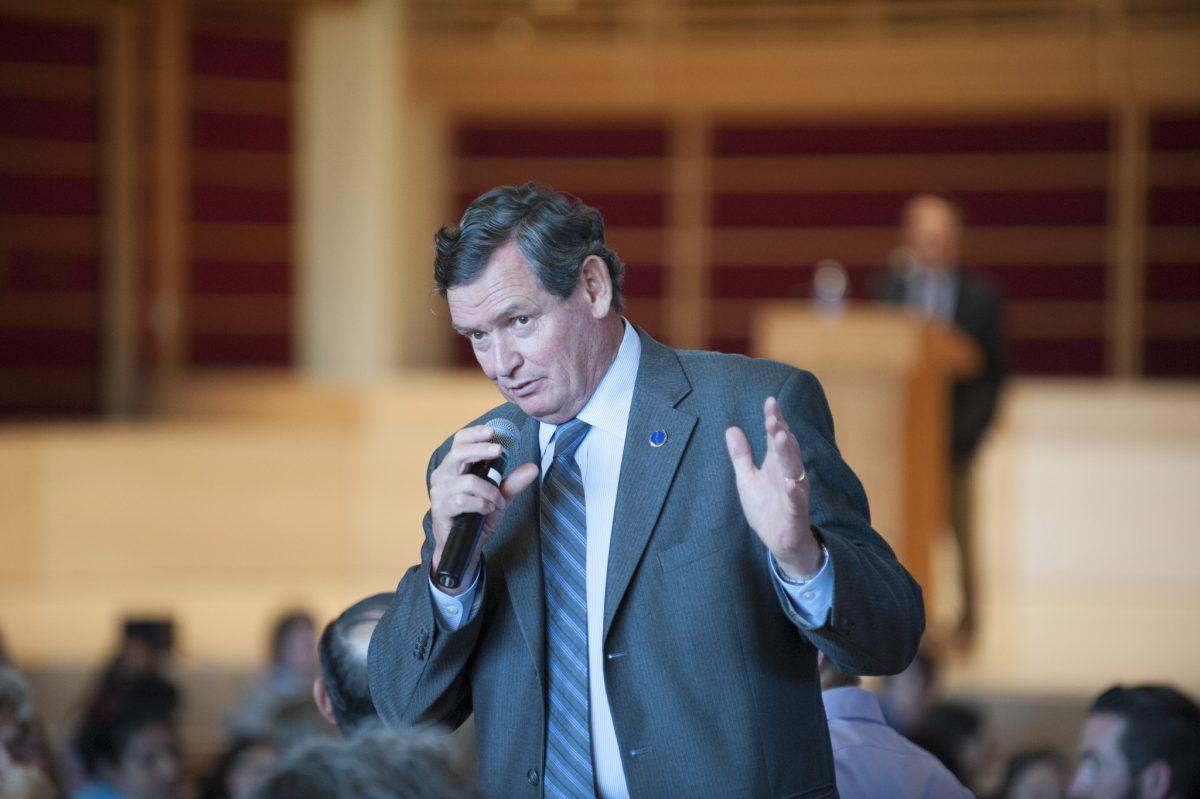California State University Chancellor Timothy P. White came to Sonoma State University last week to answer the burning questions that members of the campus have been eager to ask. Questions concerning tuition fees and ethnic issues were brought to the chancellor’s attention. White spoke of the consequences that have come about as a result of the recession.
“During the latest recession the system lost $1 billion, tuition increased, then it went back up $550,000, then went back down $450,000. We have six percent fewer employees, [but still] graduation rates went up at SSU,” said the chancellor.
The numbers don’t lie, and unfortunately they are inevitable changes.
“There’s an inconvenient math about the facts,” said White.
The fact of the matter is that the economic system can only make dramatic changes at a slow pace. However, the greatest change one can implement, according to White, starts with one’s own community. As he put it, we are sitting in a cauldron.
“Encourage students to remain engaged in your community. Because, even in tough times community stays together, because we are all moving in the same direction,” said White.
An audience member agreed with his community-marinating cauldron metaphor. She explained how students are not receiving the classes they need to graduate because the campus is accepting more freshmen than faculty are equipped to educate. The need for extra financial support is due to the new infrastructure added on campus: the new Student Center. She asked the chancellor what his view was on decision-making, concentrating on democratic choices.
White immediately referred to the new Student Center as an augmentation to campus life. He said that although the Student Center may seem illogical today, tomorrow all could benefit from such infrastructure.
“There are times that you have to make decisions that will be hard in the short term but better for the campus on the long term,” said White. “We all have ideas that we all put together for the better of the campus.”
White is positive about the somewhat uncomfortable state that comes with living in a “cauldron.”
“Great soup comes out of a hot plate. We cook stuff up that will be better for the future,” said White.
Steve Wilson, a member of the math department, brought forward the issue of students not having enough sessions and thus being unable to enroll in the classes they need. In the future the campus will not be able to reach out to alumni and receive donations to advance the resources for the campus. He asked White for a possible solution.
“We need to put these analytical software into the system. We need to manage the way students get their courses,” said White.
One student in attendance looked to create a more inviting atmosphere on campus, and asked the chancellor for advice on how to raise awareness about racism and hostility.
“This is very close to my heart. Part of it is hope and part of it is inspiration,” said White.
The student summarized her experiences before coming to the university. She grew up in Oakland, and is now attending a school in which she is a minority. For this student, sitting in a classroom where opinions and experiences differ from her own is common.
“Two different students will enrich the discussion with different points of view. If we can’t do that in a college campus, how will we do that in society?” said White.
A student leader for entrepreneurship asked how he and his team could prepare students for a career and not just a job.
He said that it is less about the material one learns and more about how one uses that material to problem solve in a society.
He added that it takes the willingness of a campus, community and people to take risks.
Another audience member put forward the idea of having a student voice represent the campus’ issues to officials in Sacramento.
“When a student goes up there and says things in her own words, it comes out more powerful. I go in there and say ‘I don’t want to raise tuition,’ but we need more resources. For every dollar we put in there is $5.67 that comes out,” said White. “But a student’s personal story, personalized, respectful and clear, that has a lot of admiration. Advocacy matters, the student voice is the most powerful and also the most fun.”



































